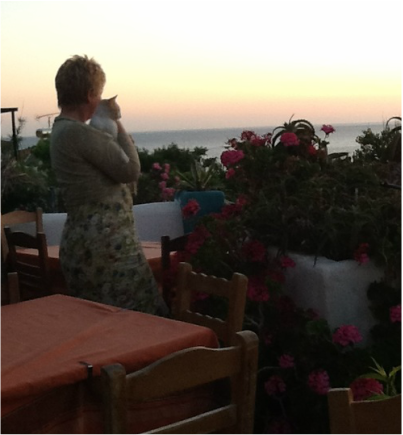|
On the last afternoon of our stay on the wild and remote island of Ikaria, as we wandered back up the cliff path from the beach, we encountered a woman crouching in the lee of the rocks with the tiniest of the cats that frequented our tavern at every meal time. She was feeding the cat high-nutrition cat biscuits, which the animal devoured eagerly. We stopped to talk.
Barbara is one of those people devoted to helping suffering creatures, and in Greece (as in many countries) there is no shortage. She organises a neutering programme with vets from the Netherlands and Ireland who give their services freely. She also goes into schools to try to educate the children about animal welfare. As well as this, when possible, she takes cats out of the country to re-home in Germany – an expensive and complicated operation by ferry, as the planes to the mainland have no space for a cat in a box. The little cat she was feeding was the sweetest creature, very friendly and affectionate, and it was comforting to know she would have a good home in the future. Barbara told us stories about the suffering of dogs up in the mountains, chained to tin drums – too hot in the summer, too cold in the winter; of how the cats are poisoned at the end of the tourist season; of places where dogs die of starvation on the doorstep in front of their keepers. We’d had a distressing visit to a restaurant earlier in the week, where the cats were starving, mange-ridden, and frightened of the restaurateur, who kicked them, so it was heart-warming to meet her. It takes someone with dogged determination, abundant kindness, and perhaps an obsessive nature, to spend so much time and money to change the lives of the Greek cats. It can be argued that we shouldn’t give time to animals when there’s so much human suffering, but I think kindness, wherever it’s given is a force for hope. And we all need that.
0 Comments
Leave a Reply. |
AuthorTricia Durdey dances, writes, and teaches Pilates. Archives
October 2017
|

 RSS Feed
RSS Feed